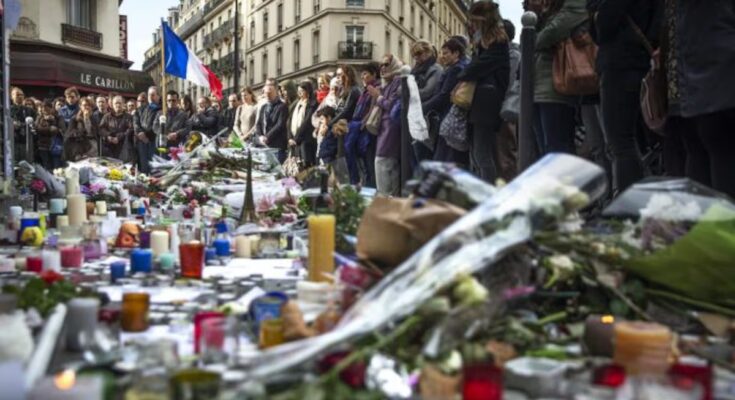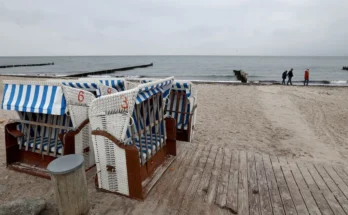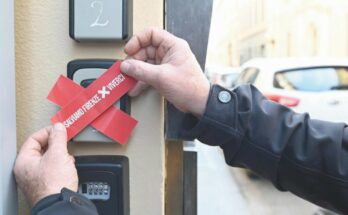I am sitting comfortably on the sofa of my apartment on rue Keller, in the 11th arrondissement of Paris. It’s 10pm on Friday 13 November 2015 and I get a call from my best friend Charlotte, who lives in the French West Indies, thousands of miles away. “Auntie, where are you? They’re shooting people in your neighborhood!” I don’t understand anything. “Turn on the TV,” he tells me. I put on BFM TV, a continuous information channel. A terrorist commando is carrying out attacks in different parts of the city, there are already dozens of deaths, the authorities are asking the population not to leave their homes. My blood is cold. One of the attacks took place in rue de Charonne, 500 meters from my house, on the terrace of the much loved and popular bar La Belle Équipe; The bodies, covered with aluminum sheets, lie scattered on the ground. There is only death and amazement. It doesn’t seem real. The images and stories that arrive from the Bataclan end up plunging the entire country into horror. I understand, like all French people, that from tonight nothing will be the same as before.
The next day, the streets are empty. The police are still looking for one of the terrorists, Salah Abdeslam. Many companies have asked their workers not to go to offices. We all fear a new attack. In the subway the tension is palpable, accentuated by numerous false alarms and panic movements. Nothing is more familiar in the streets that were stained with blood only a few hours ago. I have the impression of having lost my innocence, the feeling of protection that a country gave me and the values that had always made me feel free. Like many people, I repeatedly check the list of victims, hoping I don’t recognize anyone’s name. I read survivors’ testimonies almost compulsively. His stories are Dantesque. I wake up at night thinking about those inert bodies piled up, as if it were a mass grave and not on the floor of a concert hall, about those people who pretended to be dead so as not to receive a Kalashnikov bullet in the head, sometimes even having to remain buried under the corpses of their loved ones. The only thing that consoles me a little is the incredible national unity that is being experienced, a solidarity that the country had never experienced, not even after the attack in Charlie Hebdo.
Ten years later, that feeling of unreality continues to accompany me these days as I watch the various commemorations of the attacks, the special programs and above all the stories of the “almost alive”, as Aurélie Silvestre defines herself. This 44-year-old woman, whose story once had a profound impact on me, was pregnant with her second child when she learned that her husband, Matthieu Giroud, had died at the Bataclan theater. After the tragedy, Silvestre had to overcome the pain for the love of his children and wrote two beautiful books that he dedicated to them. Today he talks about his experience in schools and prisons. Like her, there are many victims who have chosen to transfigure trauma and pain, through associative commitment, writing, photography or conferences in educational centers and prisons.
Even if not everyone has taken that path. Others, like my friend Adelaïde, felt that the only way not to collapse was to continue with their lives. Or at least try. On the night of November 13, he was smoking a cigarette standing with some friends on the terrace of the Le Carillon bar, in the capital’s 10th district, when the terrorists started shooting. When the first volley of Kalashnikovs stopped, he got up from under the table where he had taken refuge and quickly ran towards the bar pantry, stamping on his hands and legs, in a state of total dissociation. “You become an animal, you only think about saving yourself,” he told me on the phone this week.
That night one of the boys in his group of friends died. The guilt of having survived became a sort of exhortation not to collapse. It was clear to her that to overcome the trauma she would have to return that same Monday to her job as director of the clinic, which she had taken up a few days before the attacks. She lived the following years as anesthetized, with recurring dreams in which terrorists chased her and always managed to find her hiding place, in which she could not sleep with the lights off. Meeting her daughters’ father and starting therapy helped her overcome the trauma. Today his daily life is no longer torment, but he admits: “There is never an end to the victims.” Nor can there be forgetfulness for a nation that, ten years later, is still trying to find a way to live with the trauma left by the worst terrorist attack in its history.



